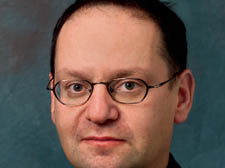| |

Professor Philippe Sands |
Is change in the US now a realistic hope?
Lecture to explore potential of Obama presidency
HOPE and change are the two words that have come to define Barack Obama, the 44th President of the United States.
With President Obama sworn in this week against a backdrop of looming recession, two unresolved wars and a $1trillion deficit, how much can these campaign slogans become statements of fact?
Professor Philippe Sands, author of last year’s explosive study on US interrogation methods, Torture Team, will explore the true potential of Obama’s presidency in a free lecture at University College London (UCL) on Tuesday. JANUARY 27
“Expectations are both very high and very low after everything that has come over the past eight years,” said Professor Sands, who teaches law at the university.
“Many people think Bush is one of the worst presidents the US has ever had,” he said.
“A huge budget deficit and a shrinking economy means that Obama’s room for manoeuvre is very limited.
“[However] a time of adversity and difficulty is precisely the moment to come up with radical and far-reaching changes.
“People are going to cut him a lot of slack.”
Under the Obama administration, Professor Sands predicts a “fundamental shift” in foreign policy, climate change and, above all, attitudes towards torture.
“Obama has broken with the Bush administration very decisively,” he said. “He is going to shut down Guantanemo and is not going to allow the use of torture under any circumstances.
“He is also going to say the United States will comply with international standards of the definition of torture.”
The Hampstead lawyer, who was personally invited to the inauguration, is taking a particular interest in the repercussions of detainee abuse. His book was the catalyst for congressional hearings before the senate last year – Mr Obama is now considering launching a formal, bi-partisan investigation into the issue.
Other events in the UCL Lunch Hour Lecture series include Dr Mike Grocott’s findings on physiology at the top of Mount Everest, which he climbed last year.
Professor Stephen Bown (UCL National Medical Laser Centre) explains how the future of cancer surgery could lie in lasers, with special photodynamic drugs pinpointing the trouble spots, eliminating the need for open surgery.
And Professor Nick Tyler grapples with the thorny concept of “well-being”, and asks whether it is really good for our health.
Further information and details of all the free lectures in the series at www.ucl.ac.uk/lhl/
Special GCSE classes for white
working-class boys
SPECIALIST teaching programmes for white working-class boys have been introduced in Camden’s lowest performing schools following below-par English and maths GCSE results last summer.
Across Camden, 46 per cent of pupils managed five good GCSEs including the core subjects, which is down from around the 55 per cent mark consistently reached since 2005.
At Haverstock School, just 32 per cent of pupils achieved the crucial benchmark.
Education chiefs believe white working-class boys are
suffering because they do not belong to a “community” like other ethnic groups.
Councillor Andrew Mennear said: “This is a big issue. We want everyone who goes to school in Camden to come out with good results.
“We have got intervention programmes in place for white working-class boys eligible for free school meals.
“It is specifically for white working-class boys, rather than girls, and for black pupils too.
“If you look at other ethnic groups like Somalis, Bangladeshis and Congolese they are achieving their highest results ever. The white working-class and black pupils are not necessarily part of communities in the same way. They are more spread out and integrated.”
He added: “The overall GCSE grades show a breadth of passes across the curriculum – but that has not been maintained when English and maths are included.”
Last summer, education minister Ed Balls announced that all schools with fewer than 30 per cent of pupils failing to achieve five GCSEs including English and maths in 2011 would be shut down and transformed into city academies.
The system benchmark for calculating whether a school is “failing” has been criticised by teaching unions who prefer a “value added” measure of students’ achievement that takes into account social factors like deprivation, or the number of pupils on free school meals.
Secondary schools in Camden achieved a value-added score which shows that pupils in the borough are “exceeding expectations” on a national scale.
Cllr Mennear said: “I can see what the
government is getting at – English and maths are very important and subjects that employers are looking at. But it is quite crude.
“Many schools that are below the 30 per cent GCSE mark receive good or excellent Ofsted reports. What is Ofsted for in this case?”
He added: “It is important to stress that no school in Camden is below the 30 per cent mark.”
TOM FOOT |
 |
|
| |
| |


